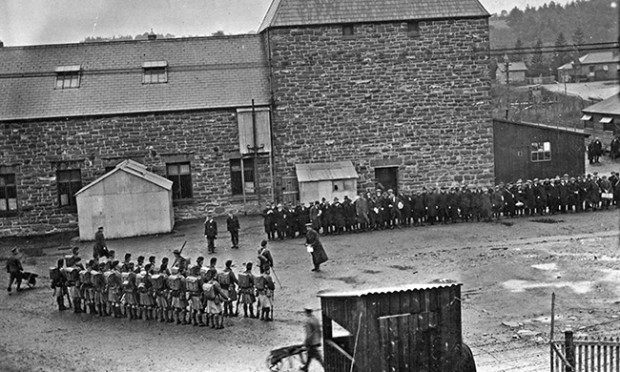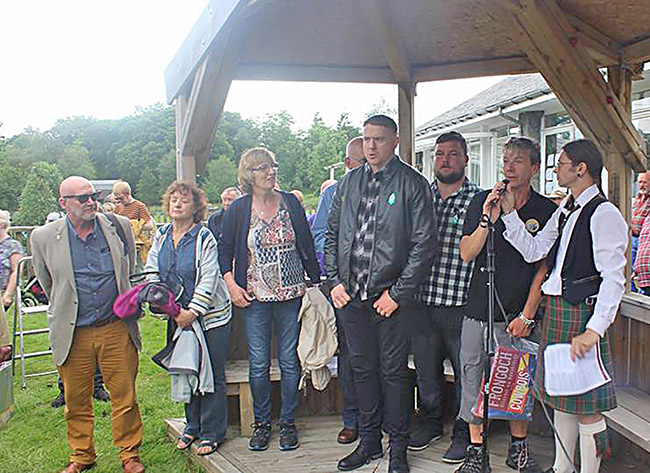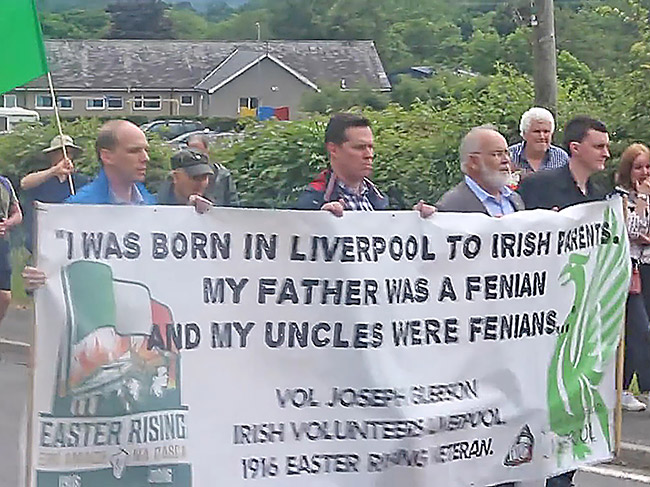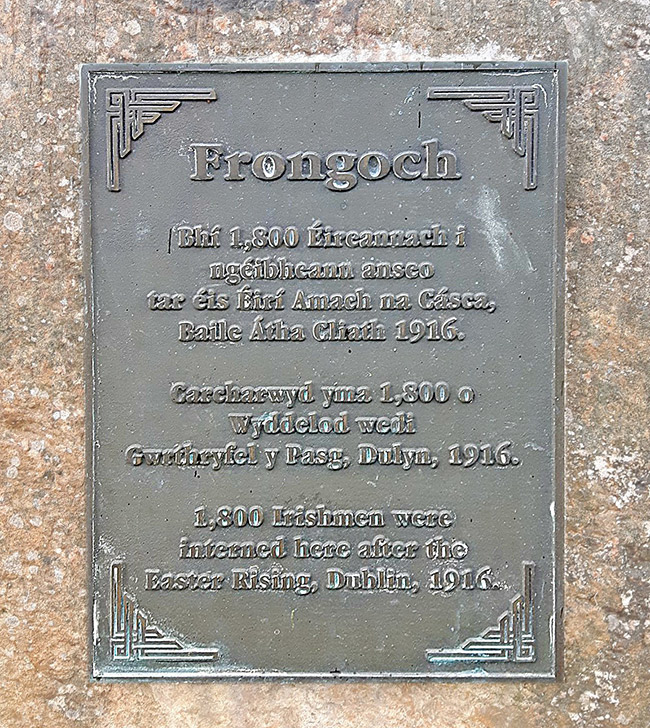1 August 2016 Edition
Frongoch – University of Revolution
Centenary commemoration at famous 1916 prison camp in Wales

• Many republicans including Michael Collins came to the fore inside Frongoch camp
Frongoch has resonated through the decades as one of the symbols of the revolutionary period in Ireland
IN THE SMALL VALLEY of Frongoch, in north Wales, 400 people gathered on 11 June to mark the 100th anniversary of the arrival almost 1,800 Irish POWs following the 1916 Easter Rising.
The internment camp at Frongoch was famously christened by its inhabitants “Ollscoil na Réabhlóide”, or “University of Revolution”. It was inside Frongoch that Michael Collins came to the fore as a leader among fighters for freedom. Frongoch’s ‘graduates’ were to play a key role in restructuring the Irish Republican Army and prosecuting the guerrilla warfare of the Tan War (1919-21). By 1920, eight former Frongoch internees were amongst the 13-member IRA GHQ Staff. By the end of 1921, 30 ‘Frongoch men’ were Sinn Féin TDs.
The morning of the centenary commemoration saw a parade along the main street of the nearby town of Bala, Gwynedd, led by the Liverpool Irish Patriots Republican Flute Band and the Cambria Band. This was followed by a procession to Frongoch’s ‘North Camp’, where flowers were laid at a memorial stone and plaque erected to commemorate the site.
There were many descendants of Frongoch internees present for the emotional occasion.
92-year-old Mairtín McCullough, son of former IRB President Dennis McCullough, had travelled from Dublin especially for the occasion. Other descendants who attended included the singer Damien Dempsey and the actor John Connors of Love/Hate fame. Coaches were also organised from Liverpool and Dún Laoghaire. Sinn Féin’s Francie Molloy MP and Councillor Sorcha Nic Cormaic were also there.
There was an exhibition hosted by Ysgol Bro Tryweryn Primary School, which was built on the site of part of what was formerly ‘South Camp’ in 1971. The exhibition featured photographs, aerial maps and artwork produced by the local pupils.

• Descendants of the internees, including singer Damien Dempsey and actor John Connors
As part of the commemorative ceremony, the pupils of Ysgol Bro Tryweryn performed a song in the Welsh language telling the story of the journey from Dublin to Frongoch. The piece was written by Myrddin ap Dafydd and set to a tune composed by Robat Arwyn.
Speaking after the performance, Francie Molloy MP told the audience:
“It just reminded me, listening to the children singing, of the words of another man who was interned, only in Long Kesh internment camp. The words of Bobby Sands that: ‘Our revenge will be the laughter of our children.’”
The Sinn Féin MP reminded people:
“What the men and women of 1916 set out to achieve has not been achieved. We still have partition in our country. Ireland is still divided and the British still occupy a part of it.”
Outlining Sinn Féin’s commitment to ending partition and realising the vision of 1916, he concluded by saying:
“Let us move on to the next revolution.”

• Francie Molloy and Joe Dwyer marching with the Cairde na hÉireann Liverpool banner
Other speakers at the event included historians Lyn Ebenezer and Seán O’Mahony; Councillor Elwyn Edwards of Gwynedd Council; Linda Tomos, representing the Welsh Government; Ambassador Daniel Mulhall; and, former Plaid Cymru MP Dafydd Elis-Thomas.
Lord Elis-Thomas famously played a pivotal role during the 1981 H-Block Hunger Strike when he passed the writ of by-election following the death of Bobby Sands MP, in response to the British Government’s desire to stall the democratic process.
Following the speeches there was a walking tour conducted by Adam Balchder and Alwyn Jones. The tour included the original house that served as quarters for the British Army camp commandant. The tour concluded at a field known locally as “Croke Park”. It was there in July 1916 that the “Wolfe Tone Cup” was contested by teams representing Louth and Kerry. In the event, Louth was defeated by just one point. The day’s commemoration concluded with musical performances by Damien Dempsey, Ian Prowse, and Willie Byrne.

The centenary commemoration was organised by local community activists and historians but received assistance through ‘Cymru'n Cofio/Wales Remembers 1914-1918’, a Welsh Government programme established to mark key global events which took place during this period and to explore their impact on communities within Wales.
The importance of Frongoch, not only to Irish history but also to the history of Wales, was reflected by the strong turnout for the day-long centenary commemoration. As the historian Jon Parry wrote:
“The name Frongoch has resonated through the decades as one of the symbols of the revolutionary period in Ireland. It was one of the few Welsh names with which Irish people were familiar, even if they found it unpronounceable. Similarly, to some Welsh men and women it became a symbol of national struggle.”




